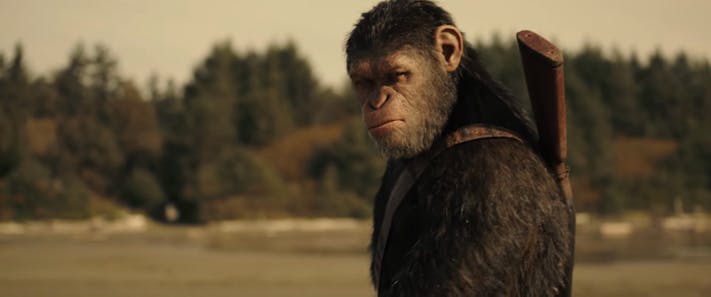Need another reason to feel guilty about being human? Then War for the Planet of the Apes may be just the film for you. The apes are now more intelligent, evolved and angrier than ever, allowing for War to establish itself as the most emotionally-charged, and best, film in the trilogy.
The film begins firmly into the war triggered by the events of the second film, with human special forces mounting an attack on the apes' jungle fortress. The remarkable intelligence that apes have developed is immediately clear, as they foil this attack with what appears to be a primitive chemical weapons attack. Despite this humbling defeat the humans push on with their attack on the apes, ultimately culminating in events which spark (lead ape) Caesar into an epic quest for revenge.
I had my fears about the plot going into this film, with its action-packed trailers and emphasis on war stinking of a film in which the producers had no fresh ideas left, but a huge budget to spend, leading to an explosive third film disappointment in the mould of The Matrix Revolutions or Spider-man 3. Thankfully my doubts were proved wrong. For much of the film it is in the mould of a revenge thriller, less a war of the primates and more of a furry Taken. This isn't to say the film lacks lavish set pieces, but they are well spread out throughout, preventing them from becoming boring and allowing for the film to maintain a balance weighted towards an exploration of evil in human nature rather than an exploration of the flashiest guns that can be convincingly handled by a CGI orangutan.
War is also highly commendable for its ability to develop real character out of the computerised animals. Andy Serkis is fantastic as Caesar, now speaking English with relative fluency, managing to make the ape incredibly human-like in its movements and character traits, without losing the raw apish essence of the character necessary to truly separate him from his human nemeses. A vastly contrasting linguistically-adept ape is also introduced in the movie, in the form of a character known as 'Bad Ape'. Bad Ape is a rather more excitable, clumsy and fearful character than Caesar, and is able to provide some surprise amusing moments. Bad Ape is thankfully not a tree climbing Jar Jar Binks; his amusing nature provides far more than cheap comic relief, his cowardliness and contrasting personality with Caesar really serves to highlight how similar to us the apes have become. This creates greater affinity between the viewer and the apes, meaning the acts inflicted upon them hit home harder than in previous films. This isn't to say the speaking apes are the only interesting characters, with the other apes use of sign language, body language and expression allowing them to each develop distinct characters despite their lack of vocabulary.
One character who felt slightly under-utilised was the army colonel portrayed by Woody Harrelson. His army base and general demeanour echo that of Marlon Brando in Apocalypse Now, and he has all the initial makings of a perfect deranged antagonist, with a fascinating goal, back-story etc. However his lines and screen-time are somewhat limited and he is never allowed to reach full flow, stunting his development and making him a good antagonist, rather than an excellent one.
On the whole however this is an excellent movie. The increased humanity and incredible performances of the various apes allows the film to evoke far greater emotion than the previous two, and therefore sets it apart as the standout film in the trilogy.




